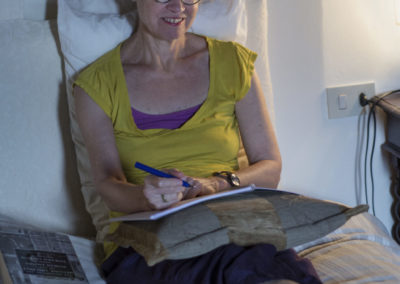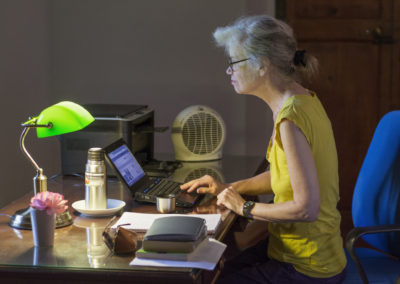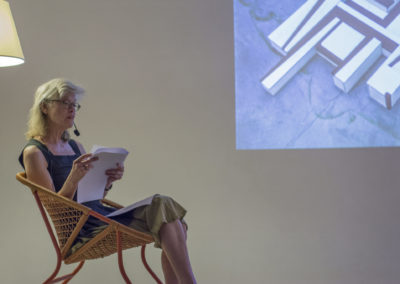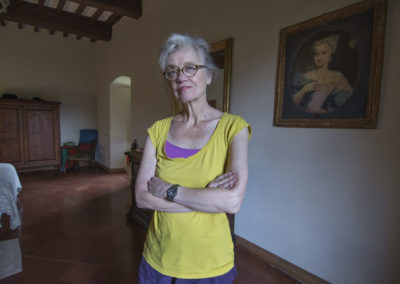The System
They were not married, but they were part of a system. In it, a certain freedom; outside, nothing. One was built low to the ground, chopped-off black hair, glasses, round face; the other, tall and seedy, a tea-drinker and lover of ancient texts. Fatty lived in the present, patrolled the school with a raggedy hemline and clunky shoes. She was brilliant, and a fine singer, with easy reach to the high C.
Betty and Boris, we called them, thrilled to see their command, in old days when two women were too many for one house and one bed. Not enough of something, and too much of something else. They had their routines, and never shared an office or a lunch where people could see.
The nuns didn’t seem to mind. How could they, living the way they did, in twos and threes with wedding rings and Jesus as their bridegroom? They looked the other way; the spiciness came from us, although they tried to thin it out with vinegar and water, a panful of Ivory flakes, and rafts of Modess “…because.”
Because why? Just because. And, we were satisfied. The system made us strong.
There wasn’t much room for speculation. There was fact: a joint car, and a house far enough away from campus, and from snoopy neighbors, to elude detection. For holidays with a religious note, each went home alone to a houseful of Catholic brothers and sisters, aunts and uncles, grandmas and kids. Boris was born with a face of crumbly plaster and a wall eye. Even as a baby, never smiled, and grew her body into a barrel, whose hoops would last as long as she did. The ‘hand grenade,’ boys her age had called her, but they liked her. Everyone liked her, or was it fear? She had a mind of her own and an appetite—not just for food, which, in those days, was plentiful, coarse, and styled to fatten the best of the herd.
She was secretive and lived inside her head, stocked with whatever she could find to read. She also liked gaping into front windows, eavesdropping in rude cafes and diners, hiding in the card section of the drugstore to hear what people were demanding, with or without a doctor’s order. Boris knew everything there was to know about the neighborhood, the parish, and the precinct by sixth grade, which she skipped. And, suddenly, in junior high, having no boys to pal around with, her view darkened, and she spent more time on her knees in front of Our Lady of Fatima. That was the name of her church. In some ways, she was a boy, forced to be a girl, with a widowed mother and older brother studying to be a priest—and more than a priest, because already in Rome. So, it was just mother and Boris at home. Her given name was Mary.
Betty was born into a family of 11 boys. She was the baby and, lugging her home in a taxi, her mother took a spill on the ice, cracked her skull, broke her arm, and baby blue, for she was a blue baby, the first to survive, caught a cold and lived her first year in the hospital, an asylum, really, for the blind, the deaf, the retarded, the crippled, the defective at birth, the injured, and the sick. As soon as Betty could put 2 and 2 together—early, because she was a genius—she was a baby to watch. The nuns wanted to keep her for their own, for many of the surviving inmates joined their order the first day they could do it, at age 14, by the bishop’s special dispensation, because staff was needed, and vocations to that servile order rare, and because their mother house was in the far reaches of Canada, and no one had heard of them.
But, Betty’s mother, never too hale and now off in different ways (always wore a hat, even in bed, and went to all the mass on Sunday, confessing her sins in each confessional box on Saturday), wanted her back, her only girl. But Betty was formed by her first birthday, and never bonded onto her mother, although they went everywhere together, Betty tied by a harness to her mother’s wrist or shopping back. She was even manacled to the back seat of the car, when the uncle offered his sister and a handful of her children, a Sunday drive.
Time passed, as it does, and the girls met in college. Betty was 15 and Boris, 16, each alienated in a different way. Boris was all business, a math major, with a 25-hour-a-week job at the doughnut shop, where they made doughnuts from dough that Boris learned to mix in the long nights alone and locked in, because in a dicey part of town: red-light, pool, card parlors, and Sons of Italy. Boris was sending part of her salary to Rome, so Billy could buy himself a silk chasuble as a newly fledged deacon, and saving part of it so mother and she could sail to Rome for his ordination one year hence. She was double-majoring in classics because the old stories appealed to her native valor and bossiness. She liked college no better than high school, but toed the line, even attending daily mass, although her faith was long gone, disappeared in grade 7, when she saw through the pretense of a One-True-Faith smacked onto every odd religion. That alone would have done it, but other things had intervened. Her best friend, Bruno, a German police dog, was beaten to death by neighbor toughs, all Catholics and one destined for the priesthood. Add to that the misery, the stupidity, the drunkenness, squalor, tedium of life everywhere but in God’s house, a castle, a theater, a place that made no difference. People went in, and came out to business as usual. Her confessor told her to slow down, take it easy on herself and on the slobs around her. That’s what he said. She laughed—a rarity—and came back to chew the fat with Father Mike, soon to depart for the missions, but the damage was done, or enlightenment, which is how Boris saw it. Life was work, study, effort to crawl out of the hole fate had put her in, and she was digging from that moment on.



